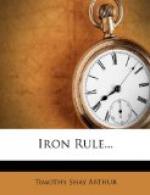Mr. Howland had one son besides Andrew—one son and two daughters. Mary was next to Andrew, Edward came next to her, and Martha was the youngest. Edward resembled his father more than any of the other children. He was cold and calm in his temperament, and little inclined to be drawn aside by the restless, vagrant spirits that were ever luring Andrew from the strict line laid down for him by his father. Daily perceiving the great value attached by his father to external propriety of conduct, Edward made a merit of what to him was easy. This vexed Andrew, who had opportunities for knowing all about the worth of Edward’s apparent excellencies, and he sneeringly applied to him the epithet of “Saint,” which was the cause of his drawing down upon himself, in more than one instance, the displeasure of his father. But he had become so used to censure and reproof, that it had little influence over him. Let him do wrong or right, he was almost sure to be harshly judged, and he had, by the time he was sixteen, almost ceased to care what others thought of his conduct.
Mary, whose age was next to that of Andrew, failed to acquire any influence over her brother. She had been fretful and peevish as a child, and he had worried her a great deal, and, in consequence, received frequent punishment on her account. This tended naturally to disunite them, and make them cold toward each other. Instead of Mr. Howland striving, as their mother ever did, to reconcile their difficulties, and make them friends, he would listen to Mary’s complaints against Andrew, and mark his displeasure by reproof or punishment. Trifles, that would have been in a little time forgotten and forgiven, were raised into importance by the stern father, and sources of unhappiness and enmity created out of the most ordinary, childish misunderstandings. Thus, in his mistaken efforts to destroy what was evil in his children, he was only rooting the evils he would remove more deeply in the groundwork of their minds. Instead of harmonizing, his actions had the constant effect of disuniting them. Brotherly love and sisterly affection had small chance for growth in the family over which he presided.
For all this, out of his family Mr. Howland was highly respected and esteemed. He had the reputation of being one of the most upright, just, and humane men in the community; and many wondered that he should have so bad a son as Andrew, whose reputation abroad was little better than at home. At school he was almost constantly involved in quarrels with other boys; and, from the immediate neighborhood of Mr. Howland, complaints frequently came of his bad conduct and reckless annoyances toward neighbors. In truth, Andrew was a bad boy; self-willed and overbearing toward his companions; a trespasser on the rights and privileges of others; and determinedly disobedient to his father. But for all this his father was to blame. While sternly repressing the evil in his child, he had not lovingly sought to develop the good. While vainly striving to root out the tares which the enemy had sown, he had injured the tender wheat, whose green blades were striving to lift themselves to the sunlight. Alas! how many parents, in their strange blindness, are doing the same work for their unhappy children.




